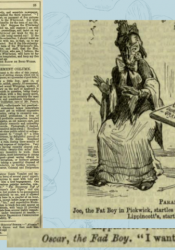Punch's Review Was Published
Punch, also known as the London Charivari, was an English illustrated weekly magazine published from 1841 to 1992 and 1996 to 2002. It was famous for its satirical humour and caricatures and cartoons. The first editors were Henry Mayhew (1812-1887), Mark Lemon (1809-1870), and Joseph Stirling Coyne (1803–1868). Mayhew was an English journalist and sociologist whose book, London Labour and the London Poor, influenced Charles Dickens, among other writers; he was known for being spot on in his reportage of people. Lemon was known for his plays, and he financially kept the magazine alive (because of these plays and because they took money to influence political opinions of caricatures) until it was popular and doing well. Coyne was remembered for his humor and puns and for his satire of Victorian social and artistic conventions. These editors were long gone from the magazine by the time they published a review along with their notoriously known illustration on The Picture of Dorian Gray. Since then, the magazine’s political affiliations were left and right, influenced by the Church, the government, not what we know today as lighter and cheeky. At the time of the review for Wilde’s novel, they were “conservative” and had enjoyed “stereotyping,” as it was its new “innovation to be reckoned with'' in the house. Along with their conservative views in 1890, Sir John Tienniel (1820—1914) was the illustrator for Punch at the time. Tienniel was an English illustrator and satirical artist best known for his illustrations in Alice’s Adventures in Wonderland (1865) and Through the Looking-Glass (1872).
The literary editor of Punch at the time was Francis Cowley Burnand (1836-1917), who most thought wrote this review under the name of “Baron the Bookworm”. But in a July 26, 1890 letter to Henry Lucy (1845-1924), a staff writer at Punch, Wilde claimed to have uncovered the Baron's true identity; Lucy edited the letter to remove the name before publication. So, we don’t know who The Baron the Bookworm is, whom the reviewer refers to as themself in the review, as the person who writes it. Either way, it was said that Baron de Book-Worms “can make or mar the success of a new book,” similar to much more popular reviewers who influenced the public’s view in the literary world.
Baron had concluded that this story could’ve been written better, was unclean in a homophobic and Biblical sense, Wilde was not a great writer, and that he wants to forget all about it. As said earlier, Baron influenced the success of this book, and with this kind of review, he definitely had discredited Wilde as a novelist.

